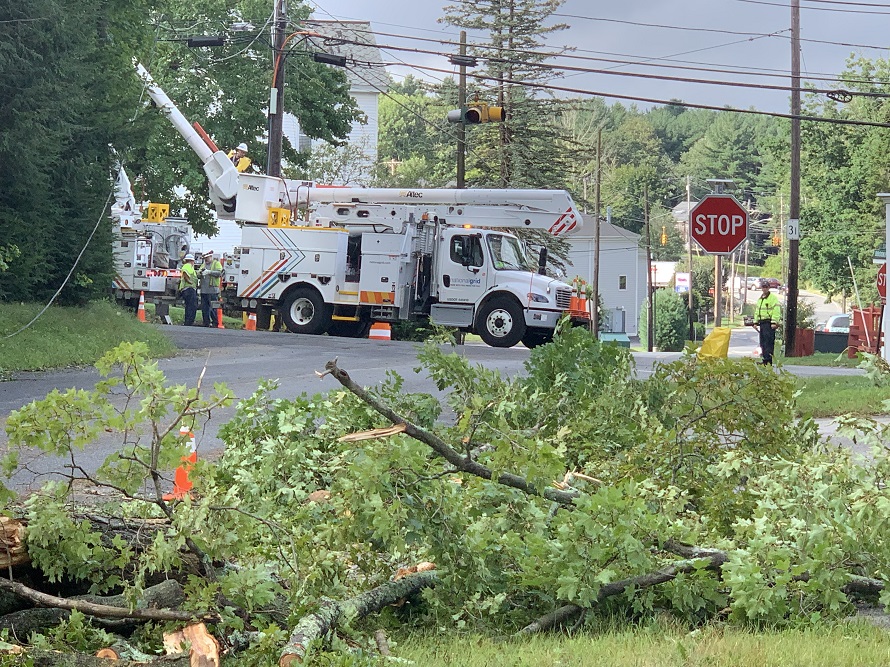National Grid Responding to Power Outages Brought on by Severe Thunderstorms Across Massachusetts
Categories:

WALTHAM, MA - National Grid is responding to a fast-moving storm that brought heavy thunderstorms and intense winds, which have caused power outages across central and northern Massachusetts.
The storm brought wind gusts of over 55 mph in some areas, as well as severe thunderstorms, and considerable amounts of rainfall, causing damage to trees and knocking down power lines. National Grid customers in Essex, Middlesex and Worcester counties were significantly impacted. These conditions are expected to continue into the evening.
"National Grid has secured additional crews and personnel across Massachusetts to repair the damage caused by this storm," said Tim Moore, Vice President for Electric Operations for New England. “We are currently working to assess the damage, address public safety and will be working to restore power as quickly as we safely can.”
National Grid is supplementing its existing crews and contractors with 50 external crews in response to the weather event. This includes overhead line, forestry, contractors, underground, damage assessment, wires down, transmission, and substation workers.
The company is continuing to monitor the weather as it moves through and has been communicating with local officials, first responders, and life support customers. The company offers the following tips and reminders:
Customers Should Stay Connected:
- Report power outages at www.nationalgridus.com or call 1-800-465-1212.
- Use your mobile device to track outage information and storm-related safety tips through National Grid’s mobile site, accessible at www.ngrid.com/mobile.
- Like us on Facebook and follow us on Twitter and Instagram; we post all the latest storm and restoration updates.
- Track outages and estimated restoration times at www.nationalgridus.com/outage-central
- To stay connected during storms and outages, text to 64743 using any of the below commands.
- REG to sign up for text alerts
- OUT to report an outage
- SUM followed by your town, county, or state to get a summary of outages in your area
- HELP for the complete list of commands
Stay Safe:
- Never touch downed power lines, and always assume that any fallen lines are live electric wires. If you see one, report it immediately to National Grid or your local emergency response organization.
- Power problems can sometimes interrupt public water supply systems or disable well pumps, so it’s an excellent idea to keep a supply of bottled drinking water handy, as well as some canned food.
- People who depend on electric-powered life support equipment, such as a respirator, should let National Grid know. To register as a life support customer, call the company’s Customer Service Center at 1-800-322-3223.
- Check on elderly family members, neighbors, and others who may need assistance during an outage.
Electric Safety:
- If you use a generator to supply power during an outage, be sure to operate it outdoors. Before operating generators, disconnect from National Grid’s system by shutting off the main breaker located in the electric service panel. Failure to do this could jeopardize the safety of line crews and the public.
- If you lose power, turn off any appliances that were on when the power went off, but leave one light on so you will know when power is restored.
Gas Safety:
- If you suspect a natural gas leak:
- Get Out - All occupants should leave the house immediately. Do not use the telephone or light switches for any reason.
- Call Us – After leaving the house and reaching a safe environment, call the National Grid 24-hour gas emergency numbers:
- New England:1-800-233-5325
- Stay Out - Do not return to your home until National Grid tells you it is safe.
Heat Safety:
- Know the signs of heat-related illness. Heavy sweating, muscle cramps, and a fast pulse aren’t just signs of being warm. They are symptoms of heat-related illnesses like heat exhaustion or heat stroke. Know the signs and pay extra attention to children, seniors, and other vulnerable groups when the temperature and humidity rise.
Reminder: It’s not safe to work in an elevated bucket during periods of increased wind gusts. Our line workers begin restoration work only when conditions are deemed safe.
About National Grid
National Grid (NYSE: NGG) is an electricity, natural gas, and clean energy delivery company serving more than 20 million people through our networks in New York and Massachusetts. National Grid is focused on building a smarter, stronger, cleaner energy future — transforming our networks with more reliable and resilient energy solutions to meet state climate goals and reduce greenhouse gas emissions.
Media Contacts
Related News
